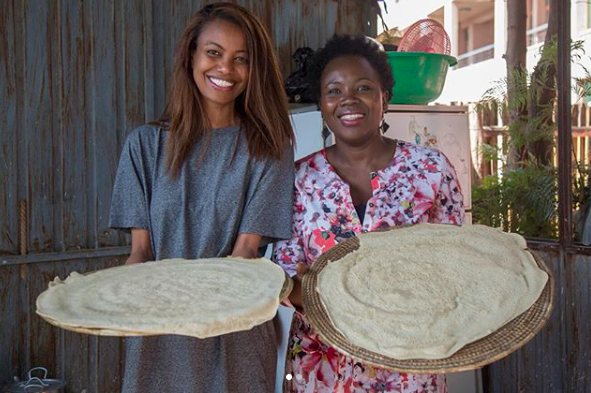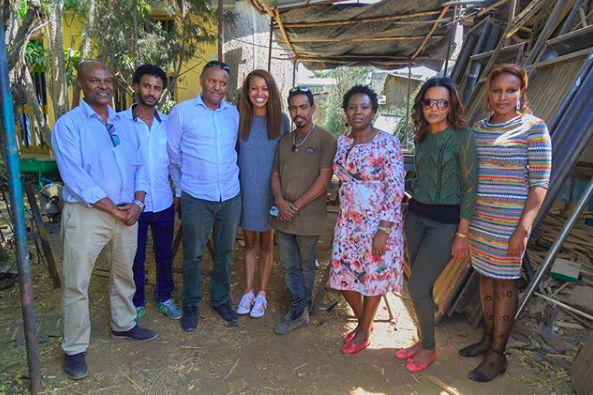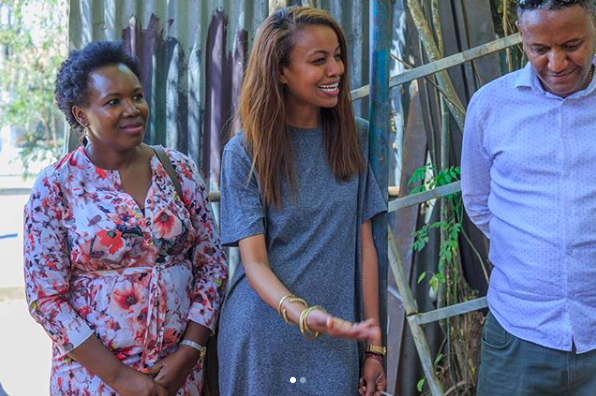Cordaid Comes to Town: Meet Akinyi Walender
 Q: How long have you worked for Cordaid Ethiopia vs. the Cordaid headquarters?A: I have worked for Cordaid for 7 years. I joined Cordaid in September 2010 on the Sudan county program. Soon after the independence of South Sudan I went on to lead the South Sudan team for three and a half years as Country Director. After mid 2013 I worked in Cordaid Headquarters in The Hague as Director, Women Leadership for Peace & Security. Then I came to Ethiopia in August 2017 as County Director to lead the strategic transformation.Q: Tell us more about your recent trip to our campus, what was your first impression?A: I was so honored to be invited to the Seeds for Africa campus in Adama. I took with me three members of my team. Fikremariam the Health Program Manager, Diramu Dub and Workneh Bekele from our Program Finance team.After meeting with the Seeds team and learning about what you do, I concluded that Seeds for Africa focuses on a very important area of society. Children are the future generation; providing early childhood and primary education is critical to ensuring an enriched future for the children. Also, improving the livelihood of women impacts the family in particular and the society as a whole to secure the future of the generation to come.
Q: How long have you worked for Cordaid Ethiopia vs. the Cordaid headquarters?A: I have worked for Cordaid for 7 years. I joined Cordaid in September 2010 on the Sudan county program. Soon after the independence of South Sudan I went on to lead the South Sudan team for three and a half years as Country Director. After mid 2013 I worked in Cordaid Headquarters in The Hague as Director, Women Leadership for Peace & Security. Then I came to Ethiopia in August 2017 as County Director to lead the strategic transformation.Q: Tell us more about your recent trip to our campus, what was your first impression?A: I was so honored to be invited to the Seeds for Africa campus in Adama. I took with me three members of my team. Fikremariam the Health Program Manager, Diramu Dub and Workneh Bekele from our Program Finance team.After meeting with the Seeds team and learning about what you do, I concluded that Seeds for Africa focuses on a very important area of society. Children are the future generation; providing early childhood and primary education is critical to ensuring an enriched future for the children. Also, improving the livelihood of women impacts the family in particular and the society as a whole to secure the future of the generation to come. Q: What was the most powerful experience you had while visiting the school?A: My first view of the children was them singing to welcome us. They were happy and looked very healthy. They were just being children, and that was so endearing. I found myself smiling all throughout. Seeds campus is a very happy and child-friendly environment. The children looked comfortable, confident and engaged. The food program was an important addition to ensure the children attended school and remained attentive.Q: Were you able to sit in on any classes? If so, what was the most memorable part of the lesson?A: I literally visited every class and had conversations with the children. We talked about their dreams and aspirations, what they wanted to be when they grew up. They have such big dreams! They want to be doctors, nurses, lawyers and engineers. One little boy wanted to be an astronaut, he is absolutely fascinated by the universe. It was amazing. I was reminded of my childhood, how big my dreams were, and I found myself looking back and thinking that I was lucky to have a dream to aspire to because that’s what propelled me forward. I still dream big today. These children are lucky to be in an environment where they are encouraged and dared to dream. In the end, our dreams are our momentum forward.
Q: What was the most powerful experience you had while visiting the school?A: My first view of the children was them singing to welcome us. They were happy and looked very healthy. They were just being children, and that was so endearing. I found myself smiling all throughout. Seeds campus is a very happy and child-friendly environment. The children looked comfortable, confident and engaged. The food program was an important addition to ensure the children attended school and remained attentive.Q: Were you able to sit in on any classes? If so, what was the most memorable part of the lesson?A: I literally visited every class and had conversations with the children. We talked about their dreams and aspirations, what they wanted to be when they grew up. They have such big dreams! They want to be doctors, nurses, lawyers and engineers. One little boy wanted to be an astronaut, he is absolutely fascinated by the universe. It was amazing. I was reminded of my childhood, how big my dreams were, and I found myself looking back and thinking that I was lucky to have a dream to aspire to because that’s what propelled me forward. I still dream big today. These children are lucky to be in an environment where they are encouraged and dared to dream. In the end, our dreams are our momentum forward. Q: What loan recipients were you able to visit?A: We visited two loan recipients, one makes injera that supplies local hotels and the other was a metal workshop.Q: What was it like making Injera?A: Wow, here I was thinking that its easy to make injera. Well it's not. It takes a lot of time standing in front of a hot stove. The lady had to produce 250 pieces of Injera within 4 hours. I take my hat off for her. It’s tough, and she’s one tough and determined lady. The Injera was delicious!Q: What was the most powerful experience you had while visiting our loan recipients?A: They both have a vision of what they want to do and where they want to go with the business. They shared how the loans had helped them grow their businesses and how much this had impacted their lives. The injera lady said she would make sure her daughter finished school to the highest level she wanted. This touched me deeply. It reminded me of the sacrifices my mother had made for me as a single parent. So I knew that the Injera Lady was on the right track and I felt so proud.The metalworks man was definitely an astute businessman, the loan had clearly made a difference and his business was growing. I was touched that he and his wife were working together to grow the business but more importantly they were giving back to the Seeds for Africa Campus by doing pro-bono repair works whenever needed and also building a kitchen for the school.
Q: What loan recipients were you able to visit?A: We visited two loan recipients, one makes injera that supplies local hotels and the other was a metal workshop.Q: What was it like making Injera?A: Wow, here I was thinking that its easy to make injera. Well it's not. It takes a lot of time standing in front of a hot stove. The lady had to produce 250 pieces of Injera within 4 hours. I take my hat off for her. It’s tough, and she’s one tough and determined lady. The Injera was delicious!Q: What was the most powerful experience you had while visiting our loan recipients?A: They both have a vision of what they want to do and where they want to go with the business. They shared how the loans had helped them grow their businesses and how much this had impacted their lives. The injera lady said she would make sure her daughter finished school to the highest level she wanted. This touched me deeply. It reminded me of the sacrifices my mother had made for me as a single parent. So I knew that the Injera Lady was on the right track and I felt so proud.The metalworks man was definitely an astute businessman, the loan had clearly made a difference and his business was growing. I was touched that he and his wife were working together to grow the business but more importantly they were giving back to the Seeds for Africa Campus by doing pro-bono repair works whenever needed and also building a kitchen for the school. Q: How do you see Cordaid and Seeds of Africa working together in the future?A: The areas of collaboration in partnership would be on maternal and child health, nutrition and business development at mid-level. For example, the metalworking business could benefit from the resilience business development support Cordaid provides to small and medium size businesses.Q: Why do you think Cordaid and Seeds makes such a perfect fit for collaboration?A: Seeds for Africa and Cordaid complement each other’s work, we both work with communities that are marginalized, that do not have access to opportunities that could change their lives if they did. Although we have different entry points we serve the same communities and we look forward to developing joint interventions and fundraising together.Q: Anything you’d like to add.A: The seeds strategy to expand the school to higher levels and provide scholarship support is worth supporting. I also noted that there was parity between girls and boys.Girl children experience so much turmoil in their school-going period that many never finish primary school. It would be worth monitoring the girls and making sure they stay in school and finish, the parents are key to this process.I was also impressed by the children’s interest in science subjects, the idea of developing the laboratory is great.Also, it would be remiss if I did not to say a word about Atti. She is kind, friendly, listens and engages at all levels and with everybody. This is an incredible gift. What Atti and the Seeds team is giving back to the community in Adama is amazing and the impact will be felt for generations to come. Way to go Atti!! Thank you for looking back, for it’s in looking back that we can move forward.
Q: How do you see Cordaid and Seeds of Africa working together in the future?A: The areas of collaboration in partnership would be on maternal and child health, nutrition and business development at mid-level. For example, the metalworking business could benefit from the resilience business development support Cordaid provides to small and medium size businesses.Q: Why do you think Cordaid and Seeds makes such a perfect fit for collaboration?A: Seeds for Africa and Cordaid complement each other’s work, we both work with communities that are marginalized, that do not have access to opportunities that could change their lives if they did. Although we have different entry points we serve the same communities and we look forward to developing joint interventions and fundraising together.Q: Anything you’d like to add.A: The seeds strategy to expand the school to higher levels and provide scholarship support is worth supporting. I also noted that there was parity between girls and boys.Girl children experience so much turmoil in their school-going period that many never finish primary school. It would be worth monitoring the girls and making sure they stay in school and finish, the parents are key to this process.I was also impressed by the children’s interest in science subjects, the idea of developing the laboratory is great.Also, it would be remiss if I did not to say a word about Atti. She is kind, friendly, listens and engages at all levels and with everybody. This is an incredible gift. What Atti and the Seeds team is giving back to the community in Adama is amazing and the impact will be felt for generations to come. Way to go Atti!! Thank you for looking back, for it’s in looking back that we can move forward.
